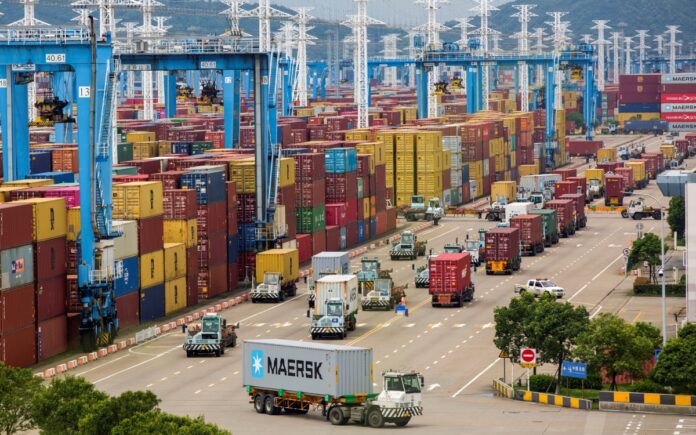Beijing/Washington: China has retaliated against the United States by imposing new tariffs on American imports, reigniting a trade war between the world’s two largest economies after President Donald Trump enforced additional levies on Chinese goods.
At 12:01 a.m. ET on Tuesday (0501 GMT), a 10% tariff on all Chinese imports to the U.S. took effect. Trump had repeatedly warned Beijing that failing to curb the flow of illicit drugs, particularly fentanyl, into the United States would result in further economic penalties.
In a swift response, China’s Finance Ministry announced it would impose 15% tariffs on U.S. coal and liquefied natural gas (LNG) and 10% tariffs on crude oil, farm equipment, and certain automobiles. The new tariffs on U.S. exports will take effect on February 10, the ministry said.
Additionally, China launched an anti-monopoly investigation into Google’s parent company, Alphabet Inc., and placed PVH Corp., the owner of Calvin Klein, and U.S. biotech firm Illumina on its “unreliable entities list.”
Beijing Tightens Control Over Rare Earth Exports
Separately, China’s Commerce Ministry and Customs Administration announced new export controls on critical rare earth elements, including tungsten, tellurium, ruthenium, and molybdenum, citing national security interests. Given that China dominates the global supply of these essential minerals—crucial for clean energy technologies—the move is expected to have significant economic and industrial ramifications.
Trump Spares Mexico and Canada but Targets China
While Trump delayed his threatened 25% tariffs on Mexico and Canada at the last minute, allowing for a 30-day pause in exchange for stronger border and crime enforcement, China received no such reprieve. A White House spokesperson confirmed that Trump would not be speaking with Chinese President Xi Jinping until later in the week.
During his first term in 2018, Trump launched a two-year trade war against China over its trade surplus, imposing tariffs on hundreds of billions of dollars worth of goods—disrupting global supply chains and causing significant economic fallout.
China-U.S. Trade Tensions Escalate
“The trade war is in the early stages, so the likelihood of further tariffs is high,” Oxford Economics stated in a research note, downgrading China’s economic growth forecast.
Trump has warned that unless Beijing stems the flow of fentanyl, further tariffs will be imposed.
“China hopefully is going to stop sending us fentanyl, and if they’re not, the tariffs are going to go substantially higher,” Trump stated on Monday.
Beijing, however, maintains that fentanyl is an American issue and has vowed to challenge the tariffs at the World Trade Organization (WTO) while leaving the door open for negotiations.
Economic Impact and Market Reaction
The U.S. accounts for only 1.7% of China’s crude oil imports, valued at approximately $6 billion last year. However, the stakes are higher for liquefied natural gas (LNG). In 2019, Beijing retaliated against U.S. tariffs by slapping duties on LNG exports. Now, China’s LNG imports from the U.S. have doubled since 2018, reaching 4.16 million tons in 2024, worth $2.41 billion.
Following China’s retaliatory tariffs, Hong Kong’s stock market pared gains, while the U.S. dollar strengthened, leading to declines in both the Chinese yuan and the Australian dollar.
“Unlike Canada and Mexico, it is clearly harder for the U.S. and China to agree on what Trump demands economically and politically. The previous market optimism on a quick deal still looks uncertain,” said Gary Ng, senior economist at Natixis in Hong Kong.
“Even if the two countries can agree on some issues, it is possible to see tariffs being used as a recurrent tool, which can be a key source of market volatility this year,” he added.
Mexico and Canada Reach Border Security Deal
While China faces increased tariffs, Mexico and Canada secured temporary relief from U.S. trade penalties. Both Canadian Prime Minister Justin Trudeau and Mexican President Claudia Sheinbaum confirmed agreements to increase border enforcement efforts in response to Trump’s demands to combat illegal immigration and drug smuggling.
As a result, 25% tariffs set to take effect on Tuesday were put on hold for 30 days.
Under the deal:
- Canada will deploy new technology and personnel along its border with the U.S. and launch cooperative efforts to fight organized crime, fentanyl smuggling, and money laundering.
- Mexico will reinforce its northern border with 10,000 National Guard troops to help curb the flow of illegal migration and narcotics.
Trump praised the outcome, stating:
“As President, it is my responsibility to ensure the safety of ALL Americans, and I am doing just that. I am very pleased with this initial outcome,” he posted on social media.
Also Read | California Wildfires Drive State Farm to Seek Emergency Rate Increases
Canadian business leaders welcomed the pause.
“That’s very encouraging news,” said Chris Davison, head of a Canadian canola trade group. “We have a highly integrated industry that benefits both countries.”
Trump Eyes European Union as Next Target
Trump has suggested that the European Union (EU) could be his next trade target, though he has not specified a timeline.
At an informal summit in Brussels, EU leaders warned that Europe would retaliate if Washington imposed tariffs but remained open to negotiations.
Also Read | Fatal Shark Attack Claims Life of 17-Year-Old Swimmer in Australia
The U.S. is the EU’s largest trade and investment partner, making any trade conflict highly consequential. However, Trump hinted that Britain, which exited the EU in 2020, might be spared from potential tariffs.
Despite concerns that tariffs could drive up consumer costs, Trump defended his approach, arguing that they are necessary to curb illegal immigration, combat drug trafficking, and strengthen domestic industries.



